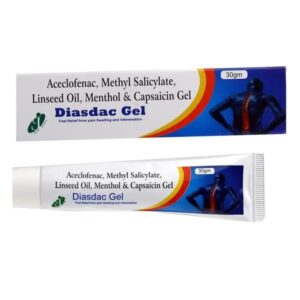DICLOFENAC DIETHYLAM INE + METHYL SALICYLATE AND MENTHOL
Diclofenac Diethylam Ine: Diclofenac Diethylamine is a nonsteroidal anti-inflammatory drug (NSAID). It is commonly used to treat pain and inflammation associated with conditions such as osteoarthritis, rheumatoid arthritis, ankylosing spondylitis, and menstrual cramps.
The mechanism of action of diclofenac diethylamine involves inhibiting the enzyme cyclooxygenase (COX), which is responsible for the production of prostaglandins. By inhibiting COX, diclofenac reduces the synthesis of prostaglandins, thereby decreasing pain, inflammation, and fever.
Diclofenac diethylamine is available as a gel or solution for topical application. The recommended dose for adults is to apply a thin layer of gel or solution to the affected area and gently massage it in. The amount of gel or solution used will depend on the size of the affected area, and the frequency of application typically ranges from 2-4 times a day.
Like all medications, diclofenac diethylamine can have side effects. Common side effects include skin irritation, rash, allergic reactions, and itching at the site of application. Less frequently, it can cause systemic side effects such as stomach pain, indigestion, nausea, vomiting, diarrhea, dizziness, headache, and fluid retention. Long-term or excessive use of diclofenac diethylamine may increase the risk of more serious side effects such as gastrointestinal bleeding, liver, or kidney problems. It is important to follow the recommended dosage and duration of treatment prescribed by a healthcare professional.
It is worth noting that diclofenac diethylamine can interact with other medications, so it is essential to inform your healthcare provider about any other drugs you are taking. Additionally, individuals with certain medical conditions such as asthma, kidney disease, or heart disease should use diclofenac diethylamine with caution and under the guidance of a healthcare professional.
Methyl Salicylate And Menthol: Methyl Salicylate and Menthol is a topical medication commonly used for the relief of muscle aches, joint pain, and minor sprains or strains. It is an over-the-counter product that comes in the form of creams, gels, or ointments.
The main active ingredients in Methyl Salicylate and Menthol are methyl salicylate and menthol. Methyl salicylate is a compound that belongs to the salicylate group, which also includes aspirin. It works by inhibiting prostaglandin synthesis, which helps to reduce pain and inflammation. Menthol, on the other hand, produces a cooling sensation on the skin, providing temporary relief from pain and discomfort.
The dose and frequency of applying Methyl Salicylate and Menthol depend on the specific product and the severity of the pain. It is generally recommended to apply a thin layer of the ointment or cream to the affected area and gently massage it until it is absorbed. It is important to follow the instructions provided by the manufacturer or the advice of a healthcare professional.
Some common side effects of Methyl Salicylate and Menthol include skin irritation, redness, and a warming or cooling sensation at the application site. These side effects are usually mild and temporary. However, in rare cases, individuals may experience an allergic reaction, characterized by severe itching, rash, hives, swelling, or difficulty breathing. If any of these symptoms occur, it is important to stop using the product and seek medical attention immediately.
Additionally, individuals with pre-existing medical conditions, such as asthma or allergies, should consult a healthcare professional before using Methyl Salicylate and Menthol, as it may interact with certain medications or exacerbate existing conditions.
Overall, Methyl Salicylate and Menthol is a topical analgesic commonly used for the relief of muscle and joint pain. It works by reducing pain and inflammation through its active ingredients, methyl salicylate and menthol. It is important to use the product as directed and be aware of possible side effects or allergic reactions. If symptoms persist or worsen, it is advised to seek medical advice.

